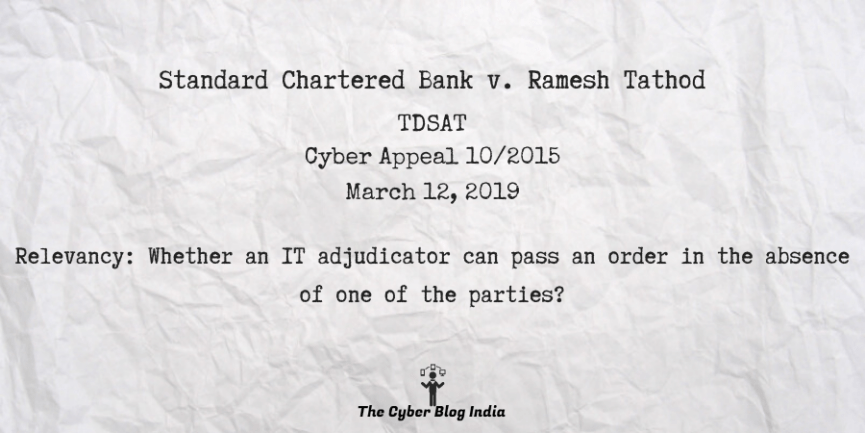Standard Chartered Bank v. Ramesh Tathod

Standard Chartered Bank v. Ramesh Tathod
In the Telecom Disputes Settlement and Appellate Tribunal
Cyber Appeal No. 10 of 2015
Before Mr. Shiva Kirti Singh, Chairperson and Mr. A.K. Bhargava, Member
Decided on March 12, 2019
Relevancy of the case: Whether an IT adjudicator can pass an order in the absence of one of the parties?
Statutes & Provisions Involved
- The Information Technology Act, 2000 (Section 43A, 47, 57)
Relevant Facts of the Case
- This appeal is filed by the appellant under Section 57 of the Information Technology Act, 2000 against the order made by the Adjudicating Officer. The Adjudicating Officers ordered that the appellant is obliged to pay Rs. 1,50,000 as compensation for the violation of Section 43A of the Information Technology Act, 2000, to the respondent for the loss and legal cost suffered by him. The appellant had to pay the respondent the aforesaid compensation within a month of the order failing which he would be charged 12% compound interest.
- The appellant raised two grievances. On the date when the hearing was fixed, the counsel for the appellant came to court but the Adjudicating Officer was unavailable. The counsel representing the appellant was told that the next date would be communicated but he didn’t receive any. Consequently, the proceeding and the order was passed by the Adjudicating officer without the appellant’s presence.
- The Appellant in the appeal also stated that Adjudicating Officer ordered the appellant to pay compensation without any reasonable facts or reasons, which was influenced by the January 2014 recommendation made by Banking Codes and the Standard Board of India regarding the security that should be provided by banks to their clients who are using electronic platforms for transactions. The appellant pointed out that the alleged fraudulent transaction took place in 2014 before the introduction of this recommendation by bank codes and hence it doesn’t apply over here.
Prominent Arguments by the Advocates
Mr. Amol Sharma, Counsel for the Appellant:
- It was submitted that the essentials for Section 43A of the Information Technology Act, 2000 are not met, since the respondent didn’t pay the money demanded by the bank although 4 years had elapsed. Hence, no loss is suffered by the respondent.
Opinion of the Bench
- The copy of the email submitted by the respondent to support the notice of the next date for the hearing was sent to the appellant, but it shows that the email was sent to all the authorities except the appellant. The impugned order shows that it was passed when the bank had not submitted a response and when no counsel was present on its behalf.
- A detailed examination of the impugned order reveals that it was passed without adequate discussion of the materials and without giving an explanation regarding how and why the appellant contravenes Section 43A.
Final Decision
- The appeal stands allowed. No order as to costs.
This case summary has been prepared by Akshara Kamath, an undergraduate student at Symbiosis Law School, Hyderabad, during her internship with The Cyber Blog India in June/July 2020.
